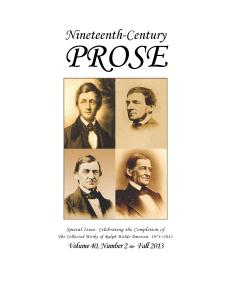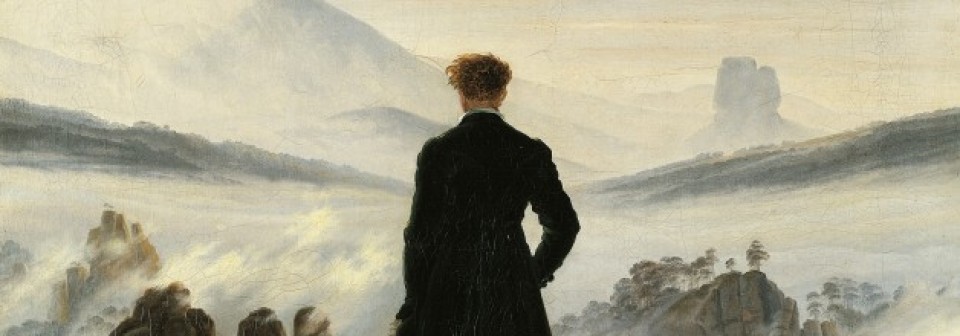
Robert N. Hudspeth, “The Collected Works of Ralph Waldo Emerson” / 1
The ten-volume Collected Works of Ralph Waldo Emerson is the first scholarly edition of the author’s works. Guided by contemporary editing standards, the edition gathers together all the poetry and prose that Emerson published in his lifetime. The edition has complete sets of textual and explanatory notes as well as introductions detailing the history of the texts and Emerson’s publishing career. The volume devoted to poetry is a variorum edition, the first of its kind in Emerson scholarship. The edition rigorously omits the posthumous publications put together by Emerson’s family and literary executor.
T. S. McMillin, “The Discipline of Abandonment: Emersonian Properties of Transdisciplinarity & the Nature of Method” / 105
This essay investigates a possible relation between primarily European, twenty-first century, science-based Transdisciplinarity and nineteenth century, humanities-based American Transcendentalism through a study of a key term in the writings of Ralph Waldo Emerson: Abandonment. The word commonly carries negative connotations: deserting someone or forsaking something, behaving with frightful recklessness, leaving home and hope behind. In many of Emerson’s essays, however, transcendental abandonment is also a way of going home, the intellectual affirmation of something bigger (to which we always belong) through the negation of something smaller (that which we mistake for our “natural” mode of thinking and being). Comparing Emersonian Transcendentalism with contemporary Transdisciplinarity is not just an academic exercise, not just for amusement nor for the satisfaction of a curiosity, but belongs to a search for responsible approaches to ecological, social, intellectual, and spiritual urgencies. The points of connection extend Transdisciplinarity beyond the sciences and lead to reconsidering the extent to which elements of historical Transcendentalism might inform present thinking beyond traditional disciplinary boundaries to address real problems.
Sara Atwood, “Black Devil and Gentle Cloud: Ruskin and Emerson at Odds” / 129
John Ruskin and Ralph Waldo Emerson are among the ‘representative men’ of the Victorian period and have by now assumed a place alongside the sort of Great Men whom they esteemed. Our current debates about education, nature, and labor echo with Ruskinian and Emersonian notions, from self-culture and self-reliance to mutuality and the value of work. We continue to face many of the problems with which they wrestled and to seek answers to the questions they asked. The two men had often admired one another’s work, but did not meet in person until 1873. While their meeting promised to be memorable, it ended in a disagreement provoked by personal and cultural differences that proved stronger than their affinities. This essay explores the ways in which Ruskin’s and Emerson’s vision of the world and of human nature, diverged, leaving each man convinced that the other’s understanding was misguided and incomplete.
David M. Robinson, “Emerson, Modern Literature, and the Question of Goethe” / 163
Emerson’s publication of “Thoughts on Modern Literature” in the newly established Dial is of particular importance because of his treatment of Goethe, whose life and work were at the center of a critical dispute that was crucial to the emergence of Transcendentalism. The importance of the essay is magnified when we remember Margaret Fuller’s advocacy of Goethe as a modern master, a project that she undertook in the face of heavy moralistic criticism from the New England intellectual establishment. In an interpretation that seconded the New England resistance to Goethe in an unexpected and singular way, Emerson argued that Goethe had failed, despite his vast accomplishment, to uphold what Emerson regarded as the crucial element of “hope” in the human character. Emerson’s indictment of Goethe’s “Olympian self-complacency” suggested the direction of his evolving thinking on ethics and political engagement over the next two decades.
John Ronan, “Self-Reliance in Emerson’s Sermons and Essays: First Series” / 181
This essay argues that Emerson developed most of the basic elements of his principal Transcendentalist doctrine of self-reliance during his tenure as Unitarian minister of Boston’s Second Church between 1829 and 1832.
Saundra Morris, “Whim Upon the Lintel: Emerson’s Poetry and a Politically Ethical Aesthetic” / 189
This essay emphasizes the importance of Emerson’s poetry. It close-reads selected poems and puts them into the contexts of Emerson’s prose and of what Morris has termed a “politically ethical aesthetic.”
Harold Schweizer, “Are We Not Beautiful” / 217
A close reading of Emerson’s poem “The Rhodora” in the context of his prose elucidates Emerson’s indebtedness to Kant’s aesthetic. Since for Kant the beautiful is the symbol of the morally good, “The Rhodora” not only exemplifies a Kantian aesthetic but also its ethical implications, both existential and environmental.
David LaRocca, “In the Place of Mourning: Questioning the Privations of the Private” / 227
As constraint is regularly the formative cause of creative action, so we find – perhaps to our confusion, even dismay – that absence and lack is often, paradoxically, the condition for plenitude. Henry David Thoreau stimulates our thinking in this apparent, yet perhaps unintuitive, direction when his years at Walden yield hours of isolation and solitude that are nevertheless full, multifaceted, and coruscating. Among other lessons, Walden teaches how the vastness of time and space, and a self-imposed distance from the values and rhythms of workaday society, do not have to confirm privation, but rather may reveal to us new approaches for neighboring ourselves. Through a series of inquiries into Thoreau’s “morning work,” conducted in awareness of his mourning work, I consider his reflections after leaving the pond – what we call Walden – in community with thoughts by Emerson, Heidegger, and Cavell. In articulating the nature of this morning work, we may discover that the private is not the privation we are often disposed to believe it is.
